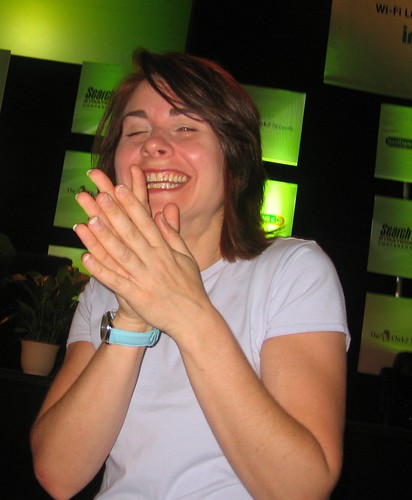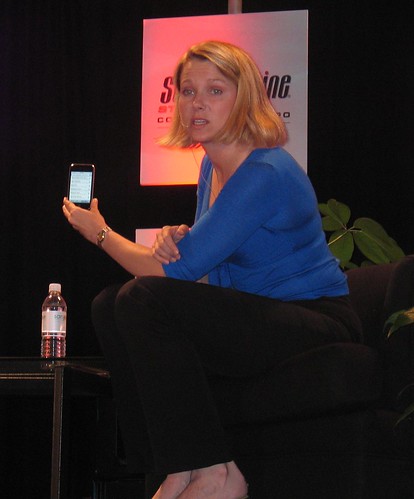Marissa Mayer, Vice President, Search Products & User Experience at Google, talks with conference co-chair Danny Sullivan about Google's moves in search, including recent changes to add more personalized and "universal" search results.
Before the event, Vanessa Fox came up to me and told me to blog about her. She doesn't work for Google anymore, though, so I don't know what she wants from us. Go away, Vanessa.
I just took 8 pictures of Vanessa and she had her eyes closed in all but one of them. Wake up, girl.
Now, Danny and Marissa sit down and they're about to talk about really cool stuff at Google.
Danny: How is the impact of universal search? Marissa: We're really happy about how it turned out. We changed a lot of the infrastructure. The users seem to be really liking it and finding what they're looking for. We know we have a way to go, though, but we wanted to go beyond 10 links and give better, richer answers. Search results should be like an encyclopedia - images, text, and other resources. Today we have images, video, news, and books integrated into the results. We will also try to pull in other results into the main SERPs.
Danny: It's been interesting to see how the pages are evolving with AJAX like clicking on PlusBoxes in maps. Marissa: We have a few bells and whistles that we call zippies and are working really well.
Danny: Do you think we'll get a lot of other results in time? Marissa: Yes, we're looking at things that are a lot more radical.
Danny: Are we having more sources going into Google Video? Marissa: We want to organize the world's information to make it useful. It didn't make sense to organize videos just from Google Video and YouTube, so we're looking hard to incorporate other video properties. It's up to the content creator to decide where to put their videos. We want to find videos from all these places.
Danny: Google Personalized Search ramped up and in May, web history was launched. How's that been going? Marissa: In the future of search, there are a lot of changes. We get better every single day. In 10-15 years, we will be better than we are now. We think we can see more relevance for the users and help them find their answers faster by knowing more about them. Many people are opting in for it. It's really interested to experiment with the new science of personalized search and how we use this data to get better relevancy.
Marissa: We're trying to do this for ads and for search. They really need to match. The query and response should be the same. We want parity in the way we match ads and the user results so that people don't have to reconstruct their queries in artificial ways.
Danny: What personalized options will be available in the future? Marissa: We're looking at things like locations, address books, web history, and we're asking our users to opt in for these features. Once we get those explicit opt-ins, we want to experiment to achieve more relevancy for personalized results.
Danny: One of the comparisons is with Amazon - when you searched for music years ago and Amazon still tries to assume that I'm interested in it. How do you want to deal with that? Marissa: We want transparency and control. You can look at the information that Google has to personalize - the searches you've done, what you've clicked on, etc. You can remove that to reverse the effect of that particular action.
Danny: What about subtle clicks? Marissa: That's a hard question. We've wondered if we should mark the results for personalization. But there's a spectrum. How much personalized results are being affected? If we mark personalized results and non-personalized results, it isn't the right model. We're looking at marking some of the results, but it's a gray area for us right now in how you should treat them.
Danny polls the audience: how many people want to have their personalized results marked? (A good number of hands goes up.)
Danny: You can't toggle results in the webmaster end for personalization. But Matt said you can add &pws=0 at the end of the URL? Can we have a button instead? Marissa: We've looked at having a toggle. Our view is that personalized results will become the default in the future because they provide a relevance boost to that user. We want personalized results. I think it's a valid request though.
Danny: We're going through a lot of privacy which was kicked off by Google. Now everyone is doing that but you are still building detailed profiles of users. How do you deal with that? Marissa: For users who want a relevance boost, we're having people sign up for a service. As part of that signup, they agree to privacy policies which is there to protect them. We may have a longer history because you've opted in. We're ultimately putting these on systems that are more protected.
Danny: We touched in the personalized experience and there's the iGoogle portal. You've had the growth in gadgets and now we have Facebook that people are saying is the new Google. How does Google view Facebook? Marissa: We're really happy with iGoogle and Gadgets. I see a lot of parallels with that and Facebook applications. With that said, there's a similar vain between both programs: they're open platforms. It's not necessarily a walled garden. The power of these programs is that anyone can create a gadget or a Facebook application. That's why they're both growing. Both provide a great opportunity to build a deeper relationship with users and also this is great for distribution. I have a Netflix queue and it's part of my homepage experience in iGoogle. It's a robust form of advertising. It's not a small piece of text; you can provide functionality and information that's responsive and interactive with the user.
Danny: Do you have to go out and have a bunch of profiles on MySpace, Facebook, and LinkedIn to understand these services? Marissa: I have profiles on all these services.
Danny: I wanted to know about other search engines. Wikia will be coming out to compete with Google. Jason Calacanis, a great friend of the SEO community (everyone laughs) decided to create Mahalo. How does Google deal with the human search engines? Marissa: Google is painted as the algorithmic purist. That's not our view. The algorithmic approach is important. That said, once you had the basic algorithm, you can layer human elements into it. We have properties like Google Co-op where people can label items and Google Notebook which has human interaction. But you need to layer the two together - algorithms and human elements to achieve relevance.
Danny: Can you tell us about adding comments to Google News? Marissa: Google news has always been focused on providing clusters. We want to provide multiple viewpoints. Krishna, the engineer behind this, wanted people to see one story and also what other people were saying behind that topic or organized presentations. We want people to see that comments. Now only can people read these published articles but they can also read the commentary, so that's why we wanted it to be compelling.
Danny: I wanted to shift over to Google Local. I wanted to talk about the usability in terms of fun or voyeurism of Google Street View? Marissa: Street view is all about finding things faster. It's nice to be able to see what a store looks like from a street address. We want people to find things faster. The product is not about looking at faces or license plates. We're going to blur the faces and license plates. The spirit of street view is more about understanding what places look like.
Danny: A hot vertical is mobile search. Tell us about that. Marissa: Google is seeing more and more mobile activity. Mobile saw this big increase. It's clear to see that people are switching off their computers and switching on their cell phones. This is true even with the iPhone - there was a big bump. We launched 1-800-GOOG-411. There's a nice integration with that and the iPhone. You get free 411 service. From that service, you can search for a particular business names, categories of that business, and related results. When you're on the phone with them, you can say "Map It," it sends you the map in an SMS message. It's very interactive. (She illustrates it on her iPhone. She has an iPhone. Cool.)
It's a particularly great application to get a lot of information.
Later, Danny asks Marissa what her favorite non-Google property is. She says Facebook, particularly with the way you are able to connect to people and write about the connections.
Then, Danny asks Marissa what her favorite Google property is. She says she cannot do that because it's like choosing a favorite child. But she likes web search, Book Search, and Google Desktop.






